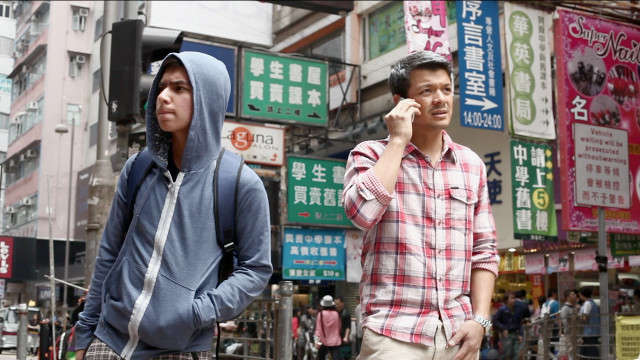SUMMARY
This is AI generated summarization, which may have errors. For context, always refer to the full article.

MANILA, Philippines – Inspired by an urban legend about kidnappers targeting children to be turned into beggars, Ian Loreños’ “Alagwa” tells the story of Robert (Jericho Rosales) and his son, Brian (Bugoy Cariño). The film opens with Robert and Brian shopping inside a mall. Brian wanders off, attracted by the various toys being peddled. Seeing that his son is missing, Robert searches the mall, then finds Brian playing with the toys. He pulls away his son from the toys and scolds him, warning him of the syndicates that kidnap children to use them as beggars.
The relationship between Robert and Brian is one that is far from ideal. Robert works as a salesman, struggling to survive within the normally wealthy Chinese-Filipino community with only the meager commissions he earns. Brian reaps the effects of his father’s position in their community’s pecking order. Constantly bullied in his school because of his paltry lot in life, he performs very poorly and is often disciplined for fighting his schoolmates. There seems to be a quiet understanding between them. Although seldom expressed, gestures are shown, signaling affectations both of them hesitate to openly give to each other.
Loreños does not hide the tragedy that will befall both father and son. In between moments that subtly express the preciousness of their relationship amidst the struggles, Loreños fast-forwards, showing scenes where Robert is seen searching the streets of Hong Kong for his missing son. The inevitability of separation is absolutely heartbreaking. The film cleverly builds up the tension, juxtaposing sequences of desperation, frustration, and loneliness with ones that are bursting with the wonderful chaos of togetherness.
Impromptu action hero
Midway, the film suddenly transforms from a quaint and deliberate portrait of a relationship that is doomed to woe into an unhinged descent down Manila’s secret sinful underbellies, complete with an apartment building populated with drug addicts, lowlifes, and children waiting to be exported to Hong Kong. The kidnapping happens, turning Robert’s cynical father into an impromptu action hero who, within a few nights, crosses paths with abusive pedophiles, inutile cops, and penitent pimps. The unexpected deviation, more an exploration of a father’s desperation than an inability for Loreños to contain his imagination, only foreshadows the impeccable emotional impact of the film’s ending.
The ending is in fact the film’s starkest contrivance. It is also its crowning glory. With a prolonged embrace, sobs, tears, and an indelible look on Robert’s reflecting a flurry of heightened emotions ranging from relief to sadness, “Alagwa” ends without regard to subtlety, and rightfully so. There are moments that deserve silence. The film, however, deserves such an impassioned bow, one that would drown all the noise and doubts with unstoppable bursts of very well-earned tears. – Rappler.com
Francis Joseph Cruz is a film critic and lawyer. You can follow him at oggsmoggs.blogspot.com.
Also check out Rome Jorge’s review of ‘Alagwa.’ – Ed.
Add a comment
How does this make you feel?
There are no comments yet. Add your comment to start the conversation.